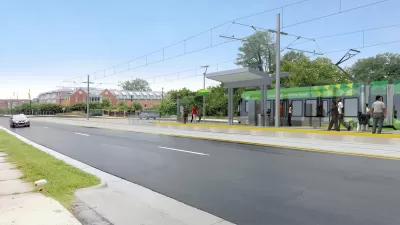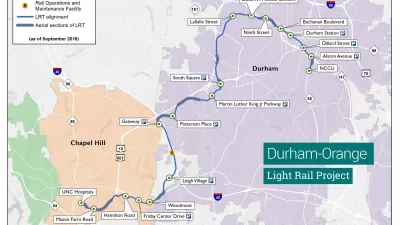Duke University will not sign an agreement for a regional rail project that has widespread support from the campus community.

On February 27, Duke University announced it would not sign a cooperative agreement for the Durham-Orange light rail project, a $3.3-billion, 17-mile rail line that would connect UNC-Chapel Hill, Duke, downtown Durham, and North Carolina Central University.
Ahead of the decision, 51 Duke faculty and staff signed onto a letter urging the university to support the project. The letter outlines the various benefits the rail line would bring to the region, including affordable housing, access to jobs and education, and improved air quality.
The university has raised a series of concerns about the rail project, but GoTriangle, the regional transit agency, says it has worked to address these issues. "For example, to quiet concerns Duke officials had about electric power connections with Duke Medical Center, GoTriangle added a $90-million elevated portion for the light rail," reports Angie Schmitt.
GoTriangle and Durham County officials are asking Duke to participate in a mediation process to address the university’s concerns.
FULL STORY: Duke Climate Scientist Criticizes the University’s Light Rail Obstructionism

Maui's Vacation Rental Debate Turns Ugly
Verbal attacks, misinformation campaigns and fistfights plague a high-stakes debate to convert thousands of vacation rentals into long-term housing.

Planetizen Federal Action Tracker
A weekly monitor of how Trump’s orders and actions are impacting planners and planning in America.

In Urban Planning, AI Prompting Could be the New Design Thinking
Creativity has long been key to great urban design. What if we see AI as our new creative partner?

King County Supportive Housing Program Offers Hope for Unhoused Residents
The county is taking a ‘Housing First’ approach that prioritizes getting people into housing, then offering wraparound supportive services.

Researchers Use AI to Get Clearer Picture of US Housing
Analysts are using artificial intelligence to supercharge their research by allowing them to comb through data faster. Though these AI tools can be error prone, they save time and housing researchers are optimistic about the future.

Making Shared Micromobility More Inclusive
Cities and shared mobility system operators can do more to include people with disabilities in planning and operations, per a new report.
Urban Design for Planners 1: Software Tools
This six-course series explores essential urban design concepts using open source software and equips planners with the tools they need to participate fully in the urban design process.
Planning for Universal Design
Learn the tools for implementing Universal Design in planning regulations.
planning NEXT
Appalachian Highlands Housing Partners
Mpact (founded as Rail~Volution)
City of Camden Redevelopment Agency
City of Astoria
City of Portland
City of Laramie





























